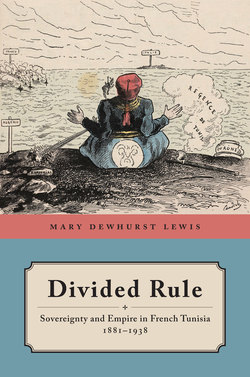Читать книгу Divided Rule - Mary Dewhurst Lewis - Страница 10
На сайте Литреса книга снята с продажи.
ОглавлениеNOTE ON ARABIC SPELLING
This is a book about a place where the majority of people spoke Arabic but at a time when very few of them wrote it. Accordingly, only a few of my sources were in Arabic and the perspectives of local populations were filtered through documents written in French, Italian or British English. These languages follow different traditions of Arabic transliteration, making consistency in spelling difficult. For common Arabic words found in the French, Italian, Tunisian and British archives, I have provided transliterations following the style sheet of the International Journal of Middle East Studies (IJMES). For instance, instead of the French spelling “caïd,” I have used the transliterated “qā’id”; instead of the French “habus,” I have used “ḥubūs,” and so on. However, I have made an exception to this rule in the notes when they refer to specific letters or documents using the French transliterations. Thus an endnote may refer to a letter written by the “caïd du Cap Bon,” where the text itself would call the same person the Cape Bon qā’id. I also have made an exception in cases where the transliterated word (e.g. shari‘a; fatwā) has become common enough in English (sharia; fatwa) to be considered part of the English lexicon.
For proper names, I have generally left the spellings as I found them in the archives. If, for instance, an individual’s name was rendered as “Mohamed” (following French transliteration) rather than “Muhammad”, as has become standard in English, I left the name as “Mohamed” to remain true to the archives. However, when persons, places or events are well-known in the English-language world, I have used the common English spelling rather than the correct transliteration. Hence: Habib Bourguiba and not Ḥabīb Būrqībah, Abdelaziz Thaalbi and not ‘Abd al-Azīz al-Tha’libī, Zaitouna Mosque rather than Zaytūna, and Eid al-Kabir rather than al-‘Īd al-Kabīr. I have dropped diacritical marks from all proper nouns. When individuals are well-known by multiple spellings, I have used the most common in the text and mention alternative spellings in the notes. For assistance with translations from Arabic to English, I thank Ali Asgar Alibhai, May Khoury, and Himmet Taskomur.
